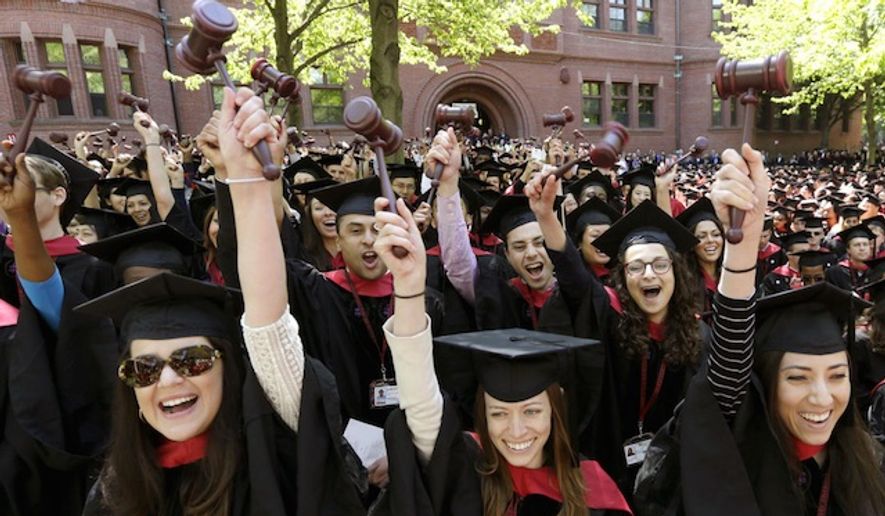For nearly 70 years prospective law school students have had to sweat through the LSAT, puzzling over intense logical reasoning questions as they try to prove they’ve got the makings of a future lawyer.
Some of the country’s top law schools, though, are moving to admit new students without forcing them to take the Law School Admission Test, saying the more general Graduate Record Examination, usually meant for liberal arts students, is now acceptable as well.
The University of Arizona has already admitted its first handful of GRE students to its law school, and Harvard, Georgetown and Northwestern are among the roughly dozen other schools preparing to follow suit.
The schools say diversity is the goal.
“All students benefit when we can diversify our community in terms of academic background, country of origin, and financial circumstances,” Martha Minow, dean of Harvard Law School, said in announcing the school’s decision in March.
Georgetown, Columbia and the University of Hawaii all said expanding access to legal education was a main reason for their decisions.
“It was time to just open the door larger,” said Andrew Cornblatt, dean of admissions at Georgetown University. “Change the make-up of the profession.”
But analysts said the law schools are also trying to protect their bottom line as applications fall — the trendline indicates classrooms won’t be as full unless law schools can find ways to entice more students in the door.
In 2009 and 2010, roughly 171,000 would-be attorneys took the LSAT, a figure undoubtedly padded by a sour economy that left recent college graduates with few prospects more attractive than staying in school. But by 2014, the number of LSAT takers hit an all-time low of 102,000. Last year, the number bumped up to 109,000.
“It’s still a low number,” said Ben Olson, an LSAT teacher and founder of Strategy Prep in Washington, D.C. “Some subpar law schools have closed because they had low enrollment, but even the best schools are feeling the squeeze.”
Mr. Olson said allowing the GRE in addition to the LSAT means a broader cross section of students, and given that law covers just about every field, that can be good for the industry.
Ms. Minow, the Harvard dean, said that breadth of knowledge was important, though she also said Harvard worried that some students were being taxed financially by taking both tests to leave their postcollege options open. Costs and fees for each test start above $200.
The LSAT is only offered four times each year, while students are able to take the GRE once every 21 days, and up to five times in a 12 month period.
Harvard plans to admit its first GRE law students later this year.
Tucson-based University of Arizona pioneered allowing GRE scores after a test. It took students already admitted to its law school based on LSAT scores, and then retested them with the GRE. It concluded the GRE was a valid way of judging aptitude for law school, the Daily Wildcat reported.
Twelve students were admitted to this year’s class based on GRE scores, 11 of them enrolled and they are doing fine, the school paper reported.
Kellye Testy, president of the Law School Admission Council, which administers the LSAT exam, said Arizona began allowing the GRE because it was in competition with Arizona State University for recruiting students.
“If it’s kept small … it’s not a problem, but if the schools aren’t careful and they let students take the GRE instead of the LSAT, then you worry the schools will be diluting the standards for the legal profession,” Ms. Testy said.
But Jason Baran, public relations manager for the Educational Testing Service. which owns and administers the GRE, said allowing applicants to take his exam instead of only the LSAT will create a more diverse student body, which could ultimately benefit the profession.
“Applications to law schools had been dropping for several years, so accepting GRE scores will allow law schools to tap into a large, diverse and talented pool, which could change the nature if not the size of law school classes,” said Mr. Baran.
He said the use of the GRE may lead to more attorneys with scientific, mathematical and technical backgrounds.
Mr. Cornblatt said the GRE applicants to Georgetown University so far have had those backgrounds and have skewed a little older than LSAT takers.
Mr. Olson said he expects GRE students to remain a small subset.
“It will be easier for many people to apply, but most applicants who truly want to go to law school will take the LSAT,” he said.
America has more than 200 law schools.
Those who have followed the University of Arizona’s lead in admitting GRE test-takers, in addition to Harvard, Georgetown, Columbia, Northwestern and Hawaii: Washington University in St. Louis, BYU Law School, George Washington University Law School and Texas A&M University School of Law.
Other schools are waiting to see what the American Bar Association recommends. The ABA offers accreditation to law schools, and requires that at least 90 percent of classes be admitted using the LSAT, and the others need to meet certain criteria.
But the ABA is in the middle of a debate over whether any specific test should required.
• Alex Swoyer can be reached at aswoyer@washingtontimes.com.




Please read our comment policy before commenting.